#les mis adaptation
Text
objectively, “I would know those rippling muscles anywhere…” is the funniest plot point in les miserables
#‘a memory stirs…’#That’s not all that—no. I shant.#les mis#les miserables#i like that various adaptations show him doing things while imprisoned to make this slightly less weird#it’s still weird#Did you just like. Never look him in the face Javert.
1K notes
·
View notes
Text
"This adaptation of Les Miserables still carries the themes of redemption and forgiveness!"
What about the themes "all cops are bastards" and "the justice system is designed to keep people down", two of the most important themes and the reason why Javert dies?
1K notes
·
View notes
Text

#besides him not being blonde im gonna go ahead and say this is the best enjolras adaptation and that is something i've been saying for a bit#enjolras#les mis#les miserables#les amis de l'abc
182 notes
·
View notes
Text
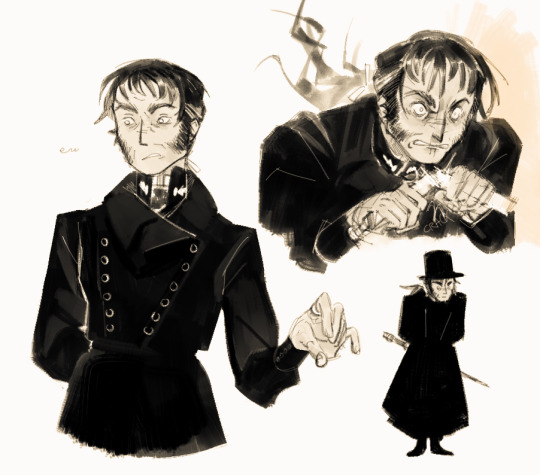

old men from classic french lit. You know
#[.art]#les mis#using the fact I'm in the middle of reading the brick to use them to practice character expressions#+ not only drawing people in their 20s is great. Do it yourself it's a lot more entertaining#javert#jean valjean#at least three quarters of the way I draw the inspector is from watching the '78 movie so much. It is not even a faithful adaptation#what it does have is the best rendition of him though#les miserables#les mis fanart
619 notes
·
View notes
Text
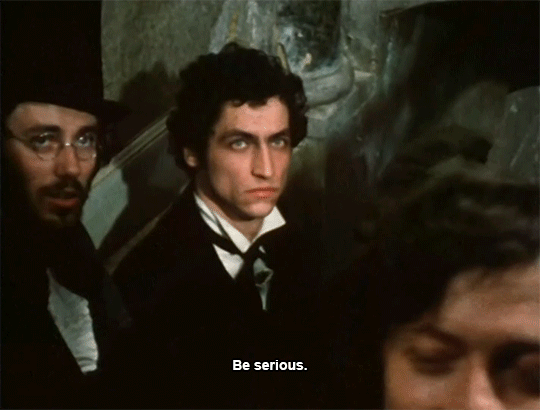


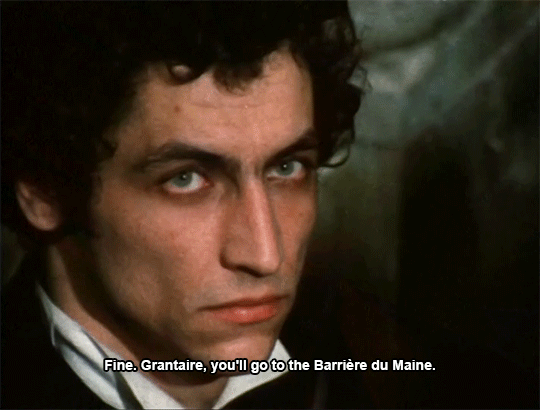
LES MIS LETTERS IN ADAPTATION - Enjolras and his Lieutenants, LM 4.1.6 (Les Miserables 1972)
“Be serious,” said Enjolras.
“I am wild,” replied Grantaire.
Enjolras meditated for a few moments, and made the gesture of a man who has taken a resolution.
“Grantaire,” he said gravely, “I consent to try you. You shall go to the Barrière du Maine.”
Grantaire lived in furnished lodgings very near the Café Musain. He went out, and five minutes later he returned. He had gone home to put on a Robespierre waistcoat.
“Red,” said he as he entered, and he looked intently at Enjolras. Then, with the palm of his energetic hand, he laid the two scarlet points of the waistcoat across his breast.
#Les Mis#Les Mis Letters#Les Miserables#Les Mis Letters in Adaptation#Les Mis 1972#Les Miserables 1972#Enjoltaire#Grantaire#Enjolras#lesmisedit#lesmiserablesedit#pureanonedits#LM 4.1.6#I kinda love this Grantaire!!!#lesmiserables1972edit
498 notes
·
View notes
Text
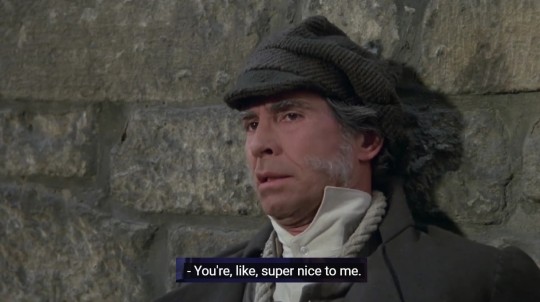

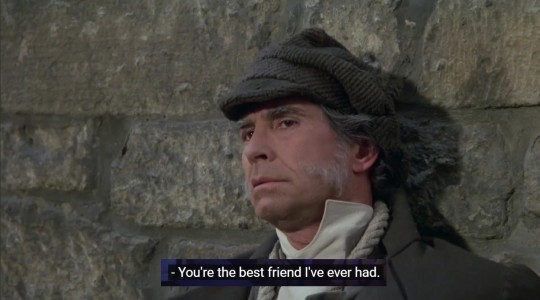
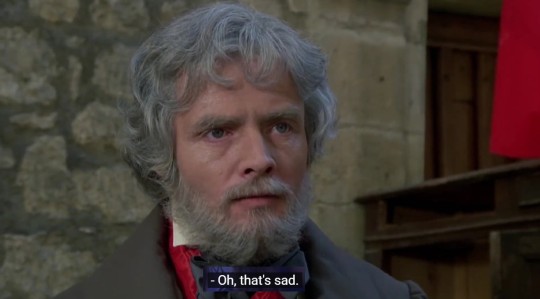

353 notes
·
View notes
Text
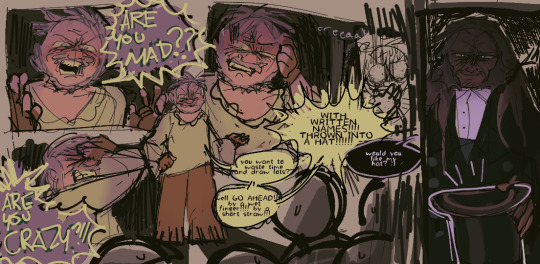
the "would you like my hat" scene (aka the coldest javert entrance in the entire book)
#les mis#les mis fanart#monsieur thenardier#patron-minette#javert#inspector javert#also i need to know if other adaptations have this scene#i only saw it in shoujo cosette
91 notes
·
View notes
Text
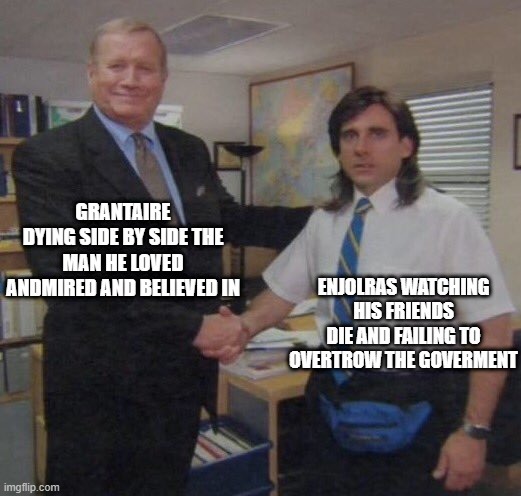
hey is this a thing?
#hehe#had this idea at like 1 am#les mis#les miserables#les mis memes#based on the famous handshake#from one of the older les mis adaptations but i forgot wich one
128 notes
·
View notes
Text
#polls#les mis#les miserables#I'm really curious#I think anyone who's seen enough has a favorite Bad Adaptation#(mine is 48 but Bedtime Stories is CLOSE)
139 notes
·
View notes
Text
jean valjean in les misérables (1978) after experiencing any kind of problem: time to jump into a body of water
#def one of the adaptions of les misérables#les mis#les misérables#les miserables#les mis 1978#les misérables 1978#jean valjean#mine
64 notes
·
View notes
Text
Jean Valjean’s issues as a parent are so sad and complicated? Because unlike in adaptations, in the book he’s not abusive at all, and has a deep horror at the idea of taking away Cosette’s freedom/agency. But at the same time—
Jean Valjean is a deeply lonely person who relies on a single young child to fill all of his loneliness. He loves Cosette, and she loves him, but he turns that mutual love into his only reason to live. He relies on his daughter to be the Sole Thing That Gives His Life Meaning. He’s utterly desperate for family and companionship and he throws all of that desperation onto Cosette.
He is sweet, loving, gentle, kind, and willing to support Cosette in whatever choices she makes, and to give her the freedom to do whatever she wants. But if she uses her freedom to choose a life outside of the little world he’s built for her…. he will allow her to make that choice, but he’ll do it while spiraling into self-destructive loneliness and despair.
He refuses to communicate honestly with his daughter about his traumatic past or her own, instead papering over uncomfortable truths with polite nothings. He doesn’t tell her things she has the right to know, under the pretext of protecting her, but more to protect himself and his own feelings.
He is a traumatized person who (as a result of his utter isolation) unintentionally puts his young daughter into the role of his caretaker— so that this 15-year-old-girl has to struggle to help her father through severe PTSD symptoms and self-destructive behaviors that he does not explain and that she has no way to understand.
It’s such a complicated, difficult relationship with no easy answers. Jean Valjean and Cosette genuinely love each other, and take care of each other, and their relationship saves both of their lives— but their relationship is also still flawed and unhealthy, in so many painful nuanced ways that are hard to actually solve.
#Les mis#Jean Valjean#this is why I dislike adaptations that are all#‘Valjean is an abusive/overprotective father who needs to learn to Let Cosette Go’#‘and in the end he lets cosette go. yay the end’#it’s so oversimplifying?#it’s replacing this really hard weird complex moral dilemma#with a basic stock trope#but that’s another post#anyway#emo#lm 4.3.1
357 notes
·
View notes
Text
Which version of this do you prefer?
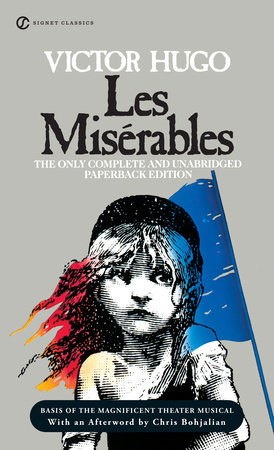

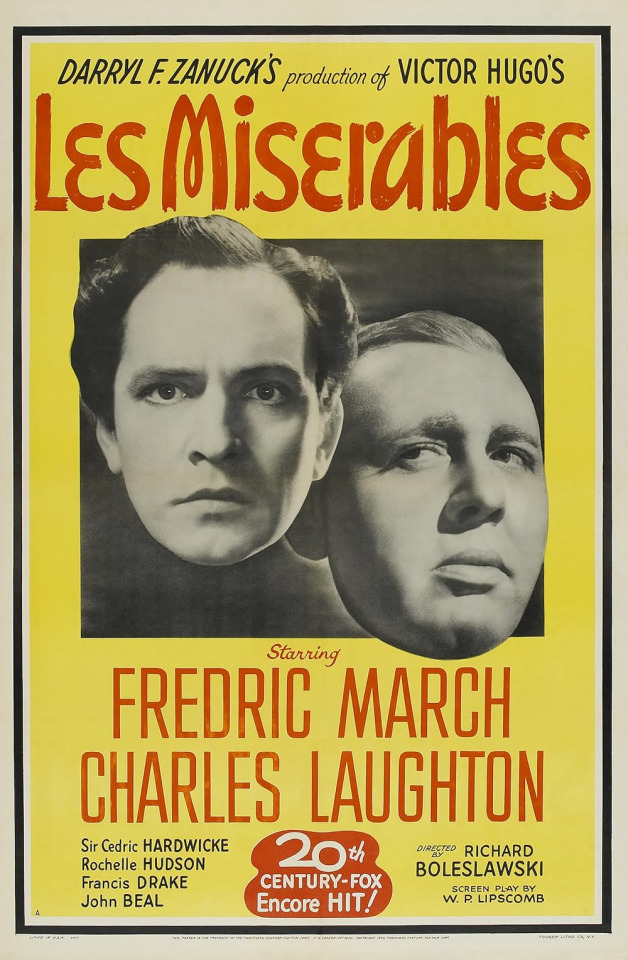

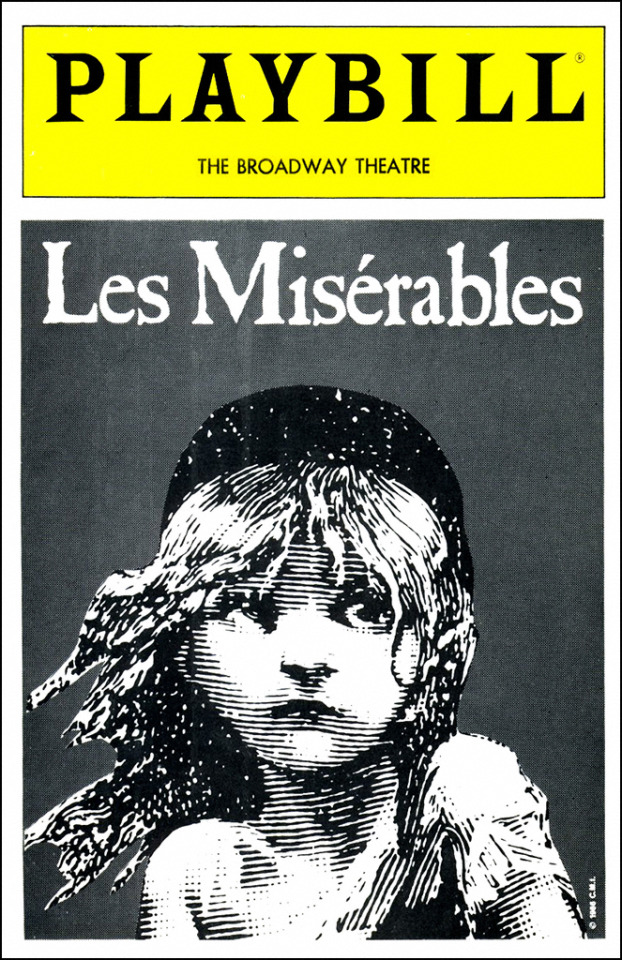

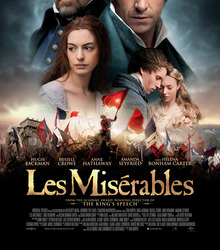

#polls#tumblr polls#adaptation polls#les mis#les miserables#victor hugo#les miserables book#les#les miserables 1998#les miserables 1925#les miserables 1935#les miserables musical#les mis musical#les miserables 1978#les mis 1978#les mis 1925#les mis 1935#les mis 1998#les mis 2012#les miserables 2012#les mis 2018#les miserables 2018#books#classical literature#musicals#theater#musical theater#movie musicals#films#tv shows
75 notes
·
View notes
Text
"Authenticity" is hard to capture when adapting Les Misérables, because as @secretmellowblog, @pilferingapples, and others have pointed out, it was already a period piece when it was published, and Hugo used events of the past to address current social issues.
Hugo used the 1832 June Rebellion to comment on the 1848 Revolution and as a veiled call to arms against Napoleon III.
A century later, Boublil and Schönberg wrote the musical, and as @pilferingapples has said, they seem to have let the student protests of May 1968 (which took place in their youth) influence their view of the June Rebellion. Hence the lines in the musical that seem to paint it as a naïve endeavor by inexperienced schoolboys, which ignore the historical fact of the 1830 Revolution.
So what we see in the stage musical is 1832 through the lenses of 1848 and 1862, through the lens of 1968.
Then when the 2012 film version of the musical was released, Tom Hooper cited Occupy Wall Street as a source of inspiration. So what we get is 1832 through the lenses of 1848 and 1862, through the lens of 1968, through the lens of 2011.
Of course this just shows that the themes are always relevant. But if the real revolutionaries of 1832 were to see all of this, I'm sure they would point out some distortions in each new telling.
265 notes
·
View notes
Text
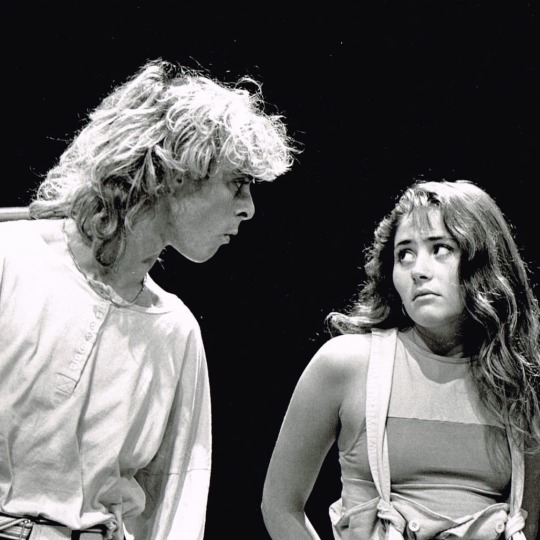
Frances Ruffelle (as Éponine) and Keith Burns (as Montparnasse) rehearsing the original opening to ‘The Attack on Rue Plumet’, 1985.
Listen to the original opening of the song here [1.30.52].
•
ORIGINAL LYRICS TO THE OPENING OF ‘THE ATTACK ON RUE PLUMET’
[ÉPONINE]
‘Parnasse, what are you doing
So far out of our patch?
[MONTPARNASSE]
This house, we’re going to do it,
Rich man, plenty of scratch
You remember he’s the one
Who got away the other day,
Got a number on his chest
Perhaps a fortune put away!
[ÉPONINE]
Oh Lord, somebody help me!
Dear God, what’ll I do?
He’ll think this is an ambush
He’ll think I'm in it too!
What’ll I do, what'll I say?
I’ve got to warn them here
I’ve got to find a way
•
[Photo sourced from Frances Ruffelle’s Instagram: “Rehearsal London 1985 Les Mis photographed here with Keith Burns (Montparnasse) in a scene which is probably cut from the show now... so as the band can get to the pub before it closes.”]
#eponine#eponine thenardier#montparnasse#the attack on rue plumet#les miserables#les mis#les mis musical#adaptations#montparnasse x eponine#némorin
174 notes
·
View notes
Text
World ain’t ready is my heartstopper
#les mis#waffle#cannot overstate how true it is where’s the 2000s era accurate live action adaptation#les amis
176 notes
·
View notes
Text

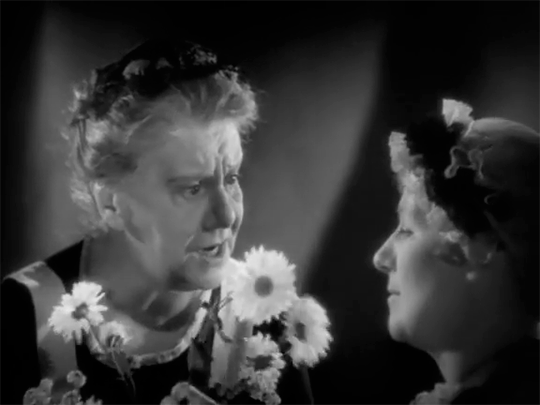

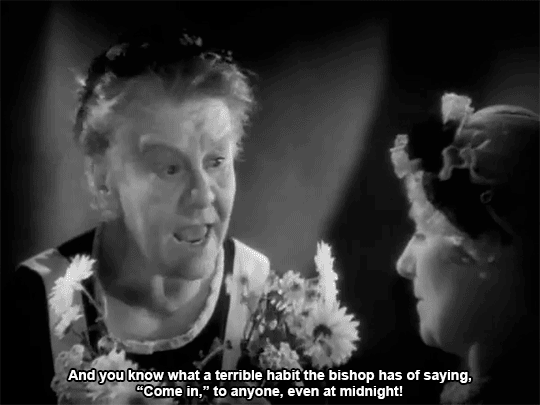

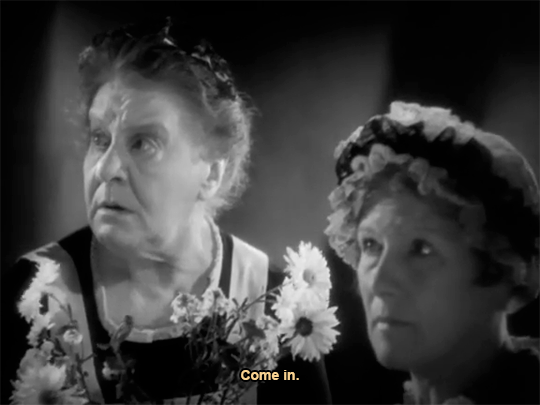
LES MIS LETTERS IN ADAPTATION - Prudence Counselled to Wisdom, LM 1.2.2 (Les Miserables 1935)
“We say that this house is not safe at all; that if Monseigneur will permit, I will go and tell Paulin Musebois, the locksmith, to come and replace the ancient locks on the doors; we have them, and it is only the work of a moment; for I say that nothing is more terrible than a door which can be opened from the outside with a latch by the first passer-by; and I say that we need bolts, Monseigneur, if only for this night; moreover, Monseigneur has the habit of always saying ‘come in’; and besides, even in the middle of the night, O mon Dieu! there is no need to ask permission.”
At that moment there came a tolerably violent knock on the door.
“Come in,” said the Bishop.
#Les Mis#Les Miserables#Les Mis Letters#Les Mis Letters in Adaptation#Les Mis 1935#Les Miserables 1925#Madame Magloire#Magloire#Baptistine#Baptistine Myriel#lesmisedit#lesmiserablesedit#pureanonedits#lesmiserables1935edit#lesmis1935edit#LM 1.2.2
77 notes
·
View notes